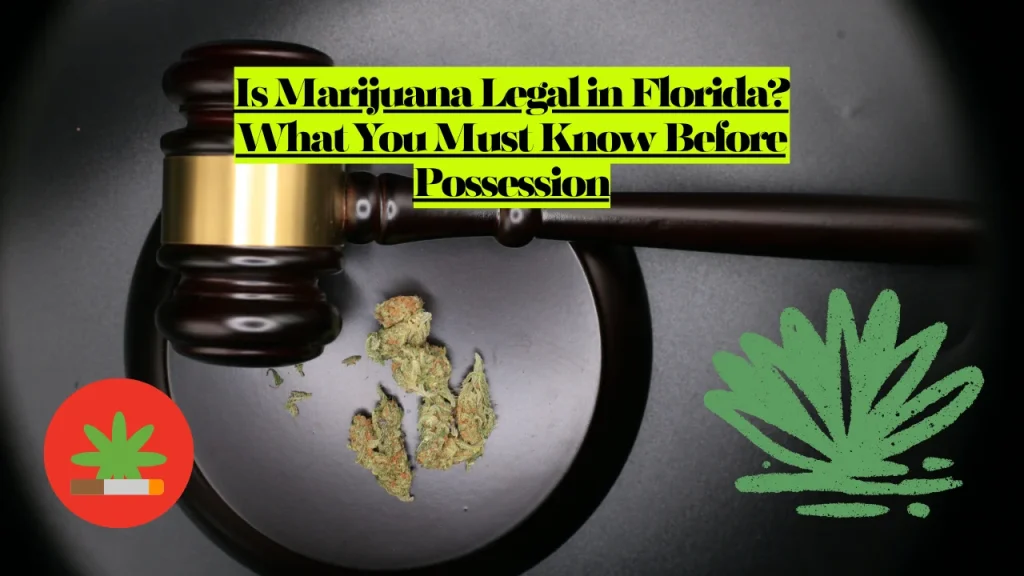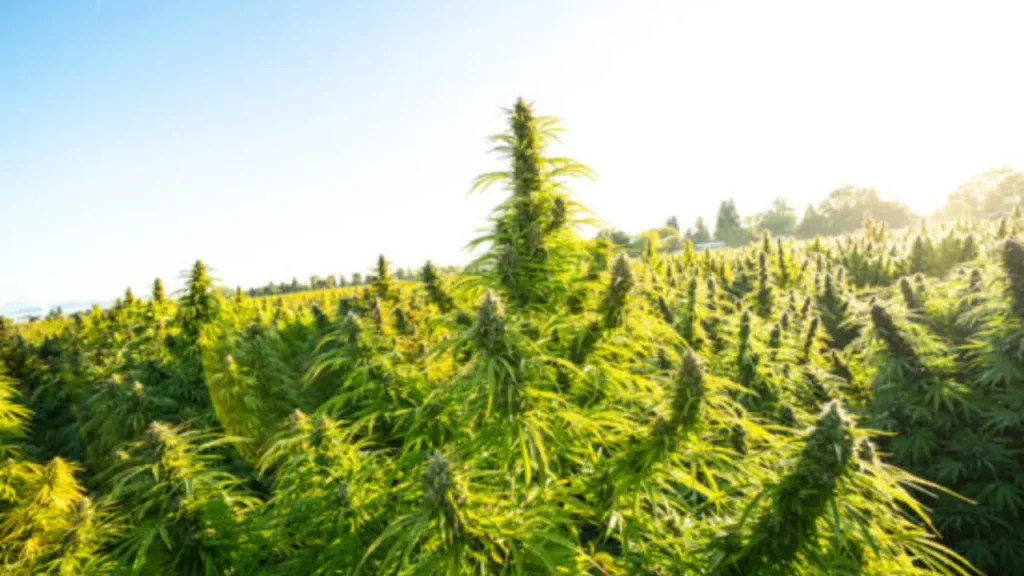Is Marijuana Legal in Florida? What You Must Know Before Possession
Recreational marijuana remains illegal in Florida as of 2024-2025. Medical cannabis is legal for patients with qualifying conditions who obtain certification from a Florida doctor. Florida voters rejected Amendment 3 in November 2024, which would have legalized recreational marijuana use.
This means Florida residents cannot legally possess, use, or purchase marijuana for recreational purposes. Only patients enrolled in the state’s medical marijuana program with proper documentation can legally access cannabis.
Understanding Florida’s Current Marijuana Legal Status
The Failed 2024 Recreational Marijuana Initiative
Amendment 3 would have legalized recreational marijuana for adults 21 years and older, allowing possession of up to three ounces of marijuana (approximately 85 grams), with up to five grams in concentrate form. However, the amendment did not receive the required 60% approval from Florida voters needed to pass.
This decisive vote means Florida maintains its prohibition on recreational cannabis, distinguishing it from many other states that have moved toward legalization.
Medical Marijuana: Florida’s Only Legal Option
In November 2016, 72% of Florida voters approved Amendment 2, legalizing medical cannabis for patients with qualifying conditions. To access medical marijuana legally, you must:
- Be a permanent or seasonal Florida resident
- Have a qualifying medical condition
- Obtain certification from a licensed Florida physician
- Be entered into the state’s medical marijuana use registry
- Possess a valid medical marijuana card
Qualifying conditions typically include cancer, epilepsy, glaucoma, HIV/AIDS, PTSD, ALS, Crohn’s disease, Parkinson’s disease, multiple sclerosis, and other debilitating medical conditions as determined by a qualified physician.
Table of Contents
Florida Marijuana Possession Laws: Criminal Penalties Explained
Understanding possession penalties is critical for Florida residents, as the consequences vary dramatically based on quantity.
Possession of 20 Grams or Less (Misdemeanor)
Possession of 20 grams or less is classified as a misdemeanor with a maximum sentence of one year imprisonment and a maximum fine of $1,000. A conviction can also carry serious driver’s license consequences under Florida law.
Important Note: Some jurisdictions like Orlando may issue citations with $100 fines for first-time offenders caught with small amounts, rather than criminal charges. However, this varies by location and law enforcement discretion.
Possession of More Than 20 Grams (Felony)
Possession of more than 20 grams and up to 25 pounds is a felony punishable by a maximum sentence of five years imprisonment. Felony convictions carry long-term consequences including:
- Loss of voting rights
- Difficulty obtaining employment
- Ineligibility for federal student aid
- Restrictions on professional licensing
- Permanent criminal record
Larger Quantities and Trafficking Charges
Possession of 25 pounds or more can result in trafficking charges with significantly enhanced penalties, including mandatory minimum sentences and substantial fines reaching tens of thousands of dollars.

Recreational vs. Medical Marijuana: Key Legal Distinctions
Recreational Marijuana Status
Current Status: Illegal in all circumstances
Florida law provides no legal protection for recreational cannabis use. Even small amounts possessed without a medical marijuana card constitute criminal activity. There are no “decriminalized” zones statewide, though some municipalities have enacted local ordinances reducing penalties.
Medical Marijuana Access
Current Status: Legal with proper authorization
Patients with valid medical marijuana cards can:
- Purchase cannabis from licensed Florida dispensaries
- Possess marijuana as authorized by their physician
- Use various forms including flower, oils, edibles, and concentrates
- Grow hemp with low THC content (subject to restrictions)
What medical cardholders cannot do:
- Use marijuana in public places
- Drive while impaired
- Provide marijuana to non-cardholders
- Possess amounts exceeding their authorized limits
- Travel across state lines with marijuana (federal law prohibits this)
Legal Implications Beyond Criminal Charges
Employment Consequences
Florida is an at-will employment state. Employers can:
- Conduct drug testing as a condition of employment
- Terminate employees who test positive for marijuana
- Refuse to hire applicants who fail drug screenings
Medical marijuana cardholders receive limited employment protection. While possessing a card is legal, employers generally maintain the right to enforce drug-free workplace policies.
Federal Law Conflicts
Despite Florida’s medical marijuana program, cannabis remains illegal under federal law as a Schedule I controlled substance. This creates complications in areas including:
- Federal employment and security clearances
- Gun ownership (federal law prohibits marijuana users from possessing firearms)
- Federal property (military bases, national parks)
- Banking and financial services
- Immigration proceedings
Housing and Custody Issues
Marijuana possession or use can impact:
- Child custody determinations
- Rental housing eligibility
- Public housing access
- Professional licensing boards
Common Legal Questions About Florida Marijuana Laws
Can I Travel to Florida With Marijuana From Another State?
No. Even if you’re traveling from a state where recreational marijuana is legal, transporting cannabis across state lines violates federal law and Florida state law. You cannot legally bring marijuana into Florida, even with a medical card from another state.
What About CBD and Hemp Products?
Low-THC hemp products containing less than 0.3% THC are legal under federal law and available throughout Florida. Hemp flower has become widely available across Florida, though there is relatively little regulation of these products.
Important distinction: Hemp-derived CBD is legal; marijuana-derived products require a medical card.
Can I Get a Medical Marijuana Card as a Visitor?
Seasonal residents can qualify for Florida’s medical marijuana program if they temporarily reside in the state for at least 31 consecutive days per calendar year, maintain a temporary residence, and return to their primary residence at least once annually.
Short-term visitors cannot obtain Florida medical marijuana cards.
What If Police Find Marijuana in My Vehicle?
Marijuana found in a vehicle can result in possession charges for the driver and potentially all occupants. Law enforcement may search vehicles based on the smell of marijuana, which courts have ruled provides probable cause.
Critical advice: Never drive with marijuana in Florida unless you have a valid medical marijuana card and are transporting it legally according to program rules.
Will Future Legalization Attempts Succeed?
While Amendment 3 failed in 2024, marijuana legalization efforts may continue. National trends show increasing support for cannabis legalization, and Florida’s substantial medical marijuana program demonstrates voter acceptance of regulated cannabis access.
However, any future recreational legalization would require a new constitutional amendment achieving 60% voter approval.
What to Do If You’re Charged With Marijuana Possession
If facing marijuana charges in Florida:
- Exercise your right to remain silent. Do not discuss the case with law enforcement without legal representation.
- Contact a criminal defense attorney immediately. An experienced lawyer can evaluate potential defenses, negotiate with prosecutors, and protect your rights.
- Document everything. Preserve evidence, witness information, and details about the arrest.
- Understand your options. Depending on circumstances, you may be eligible for diversion programs, reduced charges, or alternative sentencing.
- Act quickly. Time limits apply to legal defenses and court deadlines.

Future of Marijuana Legislation in Florida
While recreational marijuana remains illegal following the 2024 ballot defeat, Florida’s cannabis landscape continues evolving:
Potential Legislative Developments
- Future ballot initiatives for recreational legalization
- Expanded medical marijuana qualifying conditions
- Enhanced regulation of hemp products
- Local decriminalization ordinances
- Workplace protection debates for medical cardholders
Neighboring State Comparisons
Florida’s prohibition stands in contrast to states like Virginia and North Carolina, where decriminalization efforts have advanced. Understanding these regional differences is important for residents traveling across state lines.
Federal Policy Changes
Changes to federal marijuana scheduling could significantly impact Florida law. Ongoing discussions about rescheduling cannabis from Schedule I to Schedule III would not automatically legalize recreational use in Florida but could affect medical access, research, and banking services.
Resources for Legal Clarification
Official Florida Resources
- Florida Department of Health Office of Medical Marijuana Use: knowthefactsmmj.com
- Florida Statutes Section 381.986: Complete medical marijuana law text
- Florida Statutes Section 893.13: Criminal penalties for controlled substances
Legal Assistance
- Florida Bar Lawyer Referral Service: (800) 342-8011
- Legal Aid Organizations: Free services for qualifying individuals
- NORML Florida: Education and advocacy resources
Medical Marijuana Information
- Office of Medical Marijuana Use Registry: Patient registration and physician lookup
- Licensed Dispensaries: State-approved locations for legal purchases
Key Takeaways: Florida Marijuana Laws 2024-2025
✓ Recreational marijuana is illegal in Florida and will remain so after voters rejected Amendment 3
✓ Medical marijuana is legal for qualified patients with physician certification
✓ Possession penalties are serious: Misdemeanor for under 20 grams, felony for larger amounts
✓ Federal law conflicts create additional complications for employment, travel, and rights
✓ Local variations exist: Some jurisdictions have reduced penalties for minor possession
✓ Future changes possible: Legislative efforts and ballot initiatives may continue
✓ Legal advice is essential: Consult with qualified attorneys for specific situations
Important Legal Disclaimer
This article is for informational purposes only and does not constitute legal advice. Marijuana laws are complex and subject to change. Individual circumstances vary significantly, and legal outcomes depend on specific facts, jurisdictions, and representation.
If you face marijuana-related legal issues, consult with a qualified Florida criminal defense attorney immediately. Only a licensed attorney familiar with your specific situation can provide appropriate legal guidance.
Laws may change: While this article reflects current Florida marijuana laws as of October 2024, legislative amendments, court decisions, and ballot initiatives can alter the legal landscape. Always verify current laws through official sources or legal counsel.
Medical disclaimer: This article does not provide medical advice. Consult qualified healthcare providers regarding medical marijuana’s appropriateness for your health conditions.
Conclusion: Navigating Florida’s Cannabis Legal Landscape
Florida maintains a strict prohibition on recreational marijuana while operating a comprehensive medical cannabis program. Understanding the legal boundaries is essential for residents and visitors to avoid serious criminal consequences.
The rejection of Amendment 3 in November 2024 solidified Florida’s position on recreational cannabis for the foreseeable future. However, the state’s robust medical marijuana program provides legal access for qualified patients with documented medical needs.
Whether you’re a Florida resident, medical marijuana patient, or visitor, staying informed about current laws protects you from inadvertent violations. When in doubt, consult legal professionals and official state resources to ensure compliance with Florida’s evolving cannabis regulations.
Remember: The safest approach is understanding that recreational marijuana remains illegal in Florida, and possession without proper medical authorization carries significant legal risks that can impact your freedom, finances, and future opportunities.
For the most current information on Florida marijuana laws, visit the Florida Department of Health Office of Medical Marijuana Use or consult with a qualified attorney specializing in Florida cannabis law.
About the Author

Sarah Klein, JD, is a licensed attorney and legal content strategist with over 12 years of experience across civil, criminal, family, and regulatory law. At All About Lawyer, she covers a wide range of legal topics — from high-profile lawsuits and courtroom stories to state traffic laws and everyday legal questions — all with a focus on accuracy, clarity, and public understanding.
Her writing blends real legal insight with plain-English explanations, helping readers stay informed and legally aware.
Read more about Sarah
